ITB Berlin 2024:
What lies ahead in travel and tourism
Postpandemic recovery, workforce challenges, climate justice, AI and travel tech were topics that dominated ITB Berlin 2024, the world's largest travel trade show held last week (5-7 March) at Berlin's Messe Convention Center. Like many years before, Infosit was there. We participated in the industry debate and met with a number of hospitality companies and technology providers from across Europe.
In his interview with ITB Magazine, Infosit CEO Goran Mrvoš shared his view of digital solutions in the travel and tourism industry of today and tomorrow.
-If you have been providing software to hospitality companies for 20+ years, like Infosit, it is essential that you deeply understand their business goals and operations. Personalization of services and experiences is key to traveler satisfaction, and digital solutions can facilitate this, he said.

Hosting over 5,500 exhibitors from 170 countries, ITB brought together nearly 100,000 attendees from the global travel industry to explore the latest innovations and trends shaping the future of travel.
According to organizers, a record number of technology companies from over 30 countries showcased their work and innovations. Major established companies and startups alike were among exhibitors.
The event was an opportunity to learn about the latest tech trends and best practices in the digital transformation of hospitality companies. These are important to understand when thinking and planning how tech infrastructure should be upgraded in the upcoming years.
Making waves: AI featuring its own track for the first time
Unsurprisingly, artificial intelligence was the talk of the town, featuring its own dedicated AI Track at ITB Berlin for the first time ever. And it is more than a fad. Many sought to get a glimpse into the future, where AI is expected to have a game-changing influence on the hospitality industry.
Unlike previous years, where AI was mainly about chatbots and messaging, this time we saw a plethora of new applications and implementation methods across various segments of the hospitality business. These new AI features promise to boost efficiency, enhance guest satisfaction, and ultimately drive profitability.

Tourism has staged an impressive recovery from the COVID-19 pandemic, with the travel market in 2023 surpassing pre-pandemic levels, as highlighted by Charuta Fadnis, SVP of travel market research company Phocuswright. During the event's opening remarks, Fadnis touched on the industry evolution and pinpointed a key future trend: the integration of artificial intelligence by travel agents and personalized travel apps. She noted that generative AI is impacting both service providers and users alike, with approximately 80 percent of people across all age groups recognizing its significance. Companies incorporating AI into their online service offerings are witnessing substantial traffic spikes, she said.
AI also raises concerns over potential for misuse, such as generating fake reviews steering consumers towards regrettable bookings, Fadnis warned. To counter this, she proposed integrating generative AI with blockchain technology as a safeguard, ensuring reliable user identification and thwarting potential misuse.

Glenn Fogel, CEO of Booking Holdings, believes that GenAI has become an indispensable aspect of tourism, potentially offering more assistance than humans when customers plan their travel.
ITB Berlin once again proved to be an excellent place for networking, idea-sharing, and unveiling cutting-edge technologies and industry practices. It offered a large number of top-quality side events, with excellent opportunities for networking. We are looking forward to ITB Berlin 2025!

Got a project? Get in touch!
If you’re looking for a results-driven, innovative software development partner to help capitalize on new, profitable opportunities, reinvent your brand, or deliver incremental value to your business, we can help.